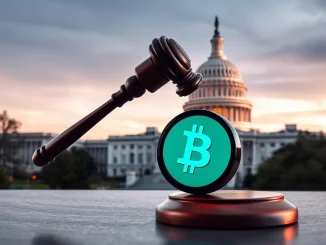
Significant news is emerging from Washington D.C. concerning the future of stablecoin regulation in the United States. After previous hurdles, reports indicate that Republicans and Democrats have finally reached a bipartisan agreement on key legislation aimed at governing this crucial sector of the cryptocurrency market. This development marks a notable step forward in the long-running effort to establish clear rules for digital assets.
What is the GENIUS Act and Why Does it Matter?
At the heart of this political breakthrough is the proposed GENIUS Act, a bill specifically designed to address the regulatory framework for stablecoins. Stablecoins, digital currencies pegged to stable assets like the U.S. dollar, are seen as a bridge between traditional finance and the volatile world of cryptocurrencies. Their growing use in transactions and as a store of value has highlighted the need for regulatory clarity to ensure financial stability, protect consumers, and prevent illicit activities.
The path to agreement on the US stablecoin bill has been challenging. Earlier versions or discussions around stablecoin legislation faced opposition from various corners, including some lawmakers who felt the proposals were either too restrictive or not comprehensive enough. Achieving a bipartisan agreement in a politically divided landscape is itself a significant event, suggesting a shared recognition of the importance of regulating this space.
What’s Next? The Push for a Senate Vote
Following this reported agreement, attention now turns to the legislative process. According to reports, Republicans are aiming to bring the agreed-upon text of the GENIUS Act forward for a Senate vote as early as this week. While the specific details of the compromise text have not yet been publicly released, the intention to push for a swift vote indicates a desire to capitalize on the momentum generated by the bipartisan agreement.
Key points to consider regarding the path ahead:
- The exact provisions of the agreed bill text remain undisclosed.
- A Senate vote is the next immediate hurdle.
- Passage in the Senate would then require the bill to navigate the House of Representatives.
- Achieving comprehensive stablecoin regulation requires coordination across multiple government bodies.
Implications of a Potential US Stablecoin Bill
The potential passage of a US stablecoin bill like the GENIUS Act could have far-reaching implications for the crypto market and the broader financial system. Clear stablecoin regulation could:
- Increase confidence among institutional investors.
- Provide a framework for banks and financial institutions to engage with stablecoins.
- Establish standards for reserve requirements and transparency for stablecoin issuers.
- Potentially pave the way for broader crypto legislation in the future.
However, the devil is in the details. The specifics of the bill will determine its effectiveness and impact. The focus remains on the upcoming Senate vote and the eventual release of the bill’s text.
Concluding Thoughts: A Step Towards Clarity?
The news of a bipartisan agreement on the GENIUS Act represents a potentially significant step towards establishing a regulatory framework for stablecoins in the U.S. While challenges remain in getting the bill through Congress and implementing effective stablecoin regulation, this development suggests a growing consensus on the need for action. The coming days, particularly regarding the proposed Senate vote, will be critical in determining the future of this key piece of US stablecoin bill legislation.



